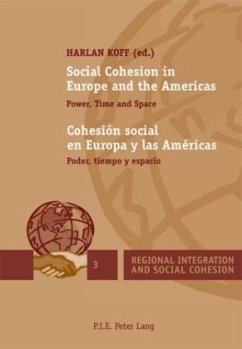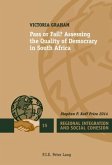Recently, many observers of social cohesion policies and practices have argued that globalization has promoted global convergence towards neo-liberal models in this field. Similarly, scholars and practitioners of regional politics have contended that Europe's social policies represent "best practices" and they have been promoted in other world regions (i.e. the recent EU-Latin American Summits) leading to convergence in policy-making. This book questions these assertions and asks whether distinctive regional approaches to social cohesion are still relevant. The comparative cross-regional analysis presented in this volume is based on the examination of competition between actors (power), the role of history and social traditions (time) and the importance of geographic limits to social cohesion (space).
Recientemente, muchos observadores de políticas y prácticas de cohesión social han discutido que la globalización ha promovido la convergencia global hacia modelos neo-liberales en este campo. Similarmente, estudiosos y practicionarios de la política regional han contendido que las políticas sociales de Europa representan las "mejores prácticas" a nivel global y por ello han sido promovidas en otras regiones del mundo (por ejemplo en las recientes cumbres UE-Latinoamérica sobre cohesión social), lo que lleva también a la convergencia en la elaboración de la política. Este libro cuestiona estas afirmaciones y se pregunta si distintos enfoques regionales a la cohesión social son todavía pertinentes. El análisis trans-regional comparativo presentado en este volumen esta basado en el examen de la competencia entre actores (poder), el papel de la historia y tradiciones sociales (tiempo) y la importancia de límites geográficos a la cohesión social (espacio).
Recientemente, muchos observadores de políticas y prácticas de cohesión social han discutido que la globalización ha promovido la convergencia global hacia modelos neo-liberales en este campo. Similarmente, estudiosos y practicionarios de la política regional han contendido que las políticas sociales de Europa representan las "mejores prácticas" a nivel global y por ello han sido promovidas en otras regiones del mundo (por ejemplo en las recientes cumbres UE-Latinoamérica sobre cohesión social), lo que lleva también a la convergencia en la elaboración de la política. Este libro cuestiona estas afirmaciones y se pregunta si distintos enfoques regionales a la cohesión social son todavía pertinentes. El análisis trans-regional comparativo presentado en este volumen esta basado en el examen de la competencia entre actores (poder), el papel de la historia y tradiciones sociales (tiempo) y la importancia de límites geográficos a la cohesión social (espacio).







